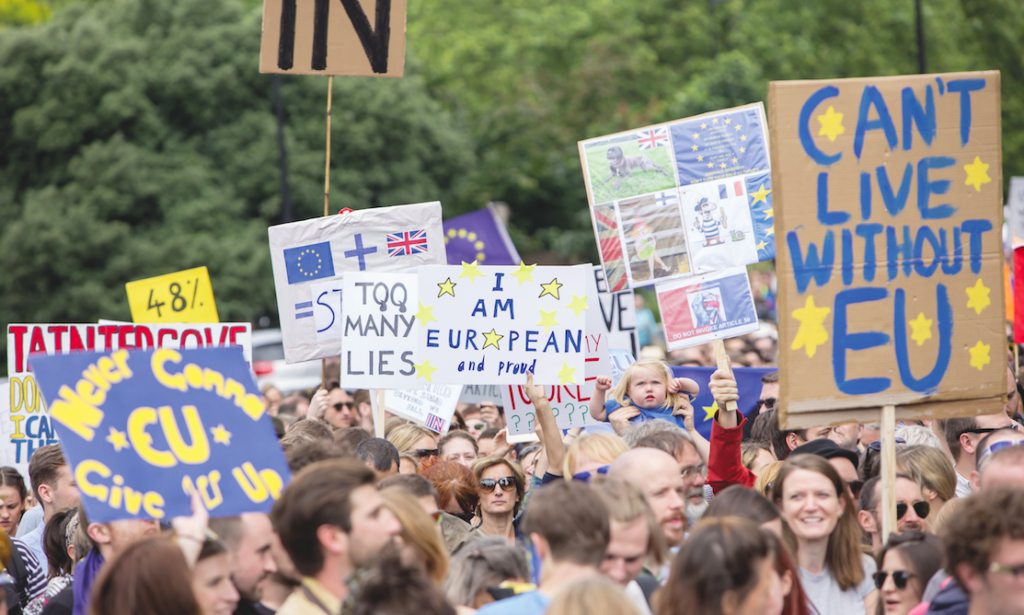Brexit is complicated. Nobody knows what the future relationship between the United Kingdom and the European Union is going to look like exactly. Which leaves all of us guessing at its impact on the Dutch plant and flower exports. ”Hard or soft Brexit? What’s certain, is that it will hurt in any case.”
By Arie-Frans Middelburg
“Brexit is like being asked to build a house that has to be finished by March 2019 without receiving any drawings. You’ve got to make a start nonetheless, or you won’t be finished on time. That’s exactly the situation we’re in at the moment.”
This apt comparison was made by Jean Crombach, technical director of the Dutch Quality Control Bureau (KCB). When the United Kingdom ceases to be a member of the European Union, they will no longer be part of the EU’s internal market. And they will no longer be part of the Customs Union. The UK will become like a third country.
As a result, plants and flowers exported from the Netherlands to the UK, might have to go through phytosanitary inspections. Or maybe not, it all depends on the agreements that the UK and the EU are going to make. If there are going to be inspections, where are they going to take place? In the Netherlands? Or will the British not accept the Dutch inspections and are they going to organise it all themselves? As a third country, they’ll have the right to inspect all goods that enter the country.

New relationship
All in all, KCB is facing a lot of uncertainties at the moment. They calculated that in the event that they are going to be responsible for the inspections of fruit, vegetables and floricultural products exported to the UK, they’ll need 30 additional inspectors. The semi-public administrative body would need around nine months to hire and train all of them, says Crombach.
That’s why KCB got in touch with the government and the branch organisations. “We need to know what to do by June of this year”, explains Crombach. That’s going to be hard, as many of the details regarding the new relationship between the UK and the EU probably won’t be finalised by then.
Potential changes for plant and flower exports are not limited to phytosanitary inspections. Exporters will be dealing with more paperwork, not just relating to inspections, but also because of customs formalities. Import duties could be introduced and automatic VAT payments could end; exporters might have to pay and get reimbursed via the Dutch government instead.
And what about waiting times at the borders? Lorries can simply drive into the UK without any hassle at the moment. Will drivers have to stop and have their paperwork checked at the border in the future? With long waiting times as a result?
Transport and Logistics Netherlands (TLN) is very concerned. “We’re expecting daily delays for transports into the UK. The capacity of the IT systems at UK customs is one of our major concerns. It is estimated that they will be dealing with 300 million declarations, six times more than the current number. Furthermore, in the event of a hard Brexit, the United Kingdom will need at least 5,000 additional customs workers. Will they be able to find those in time?”, says Elmer de Bruin, Team Coordinator International at TLN.
Fast lane
Exporters of horticultural products are hoping that the British borders will be equipped with a fast lane for fresh produce. Whether such a lane – allowing lorries to go across the border after a quick paperwork scan from the vehicle – remains to be seen. De Bruin points out that Dover, one of the major border crossings, doesn’t even have space for a fast lane. It consists of a very small area, where 10,500 lorries enter the country every day.
Are the British willing to accept a digital check or do they actually want to see all the paperwork? De Bruin stresses that things will change in 2019, no matter what the exact scenario is going to be. “There’s no denying the fact that we’ll be going through customs again, which simply comes with certain paperwork, IT procedures and customs officers.”

High costs
KPMG calculated that a hard Brexit (if the UK leaves the EU without an agreement) would cost Dutch businesses a lot of money. The costs for imports and exports would go up by at least €387 to €627 million per year. This amount excludes the still to be calculated customs duties, VAT related costs and any sector specific market access requirements that are unknown at the moment.
Extra costs with regards to customs formalities are expected to amount to €78.20 to €126.70 per shipment. Add to that the industry specific costs. For cut flowers, these specific additional costs could be somewhere between €120 and €190 per shipment.
VNO NCW (Confederation of Netherlands Industry and Employers) demonstrated with earlier calculations that a hard Brexit would lead to an additional tens of millions, up to a hundred million euro even, of import duties for each €1 billion of flowers, plants and bulbs exported from the Netherlands to the UK.
There’s still an awful lot of uncertainty about the impact of Brexit, agrees Matthijs Mesken, director of VGB. So far, the only concrete consequence that we’ve seen since the UK announced their departure from the EU, is that the exchange rate of the British pound has gone down. As a result, the value of plant and flower exports to the UK has decreased. The total value was €859,018 in 2016 and that number went down to €836,684 in 2017.
Mesken feels that the whole matter is very complicated. “We really don’t know where it’s all going to go. It’s anyone’s guess at the moment and that’s what makes it so tricky. What’s certain, is that it will hurt in any case.”




